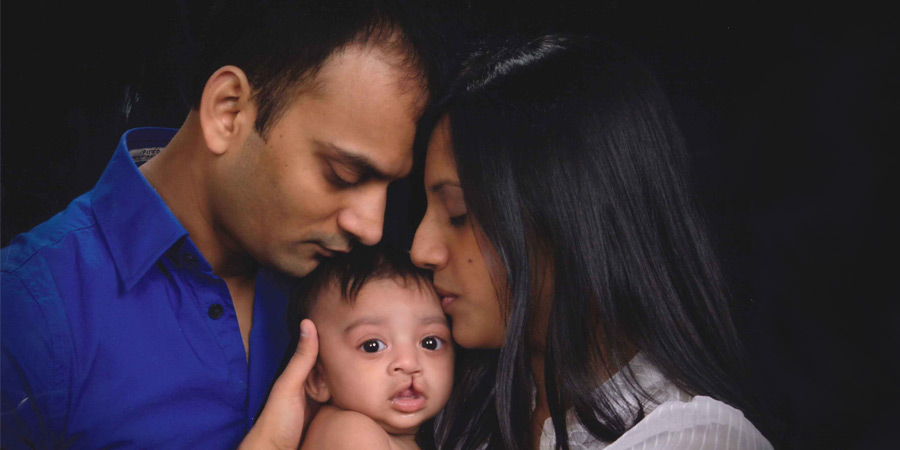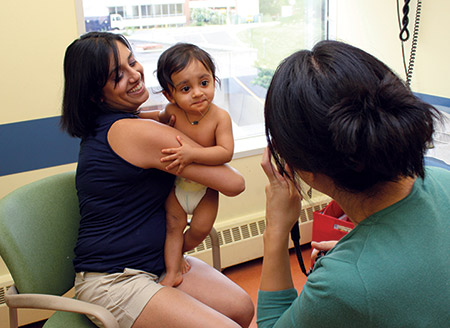A Bright Future for Kian
January 13, 2017
GBMC’s Cleft Lip and Palate Team ensures a normal life for young boy
For first-time mother-to-be Vipra Patel, the term “cleft lip and palate” was just something she’d heard about happening to others. But, during an ultrasound midway through her pregnancy, she was shocked to learn that her growing baby would be born with the condition. This is her story, in her own words.
In May 2011, like any new parents-to-be, my husband, Rakesh, and I were excited and ready to meet our new bundle of joy. It didn’t cross our minds that something might be wrong. But during an ultrasound, it was clear that our first son, Kian, would be born with a cleft upper lip and palate.
Before Kian was born, Rakesh and I met with GBMC’s Cleft Lip and Palate Team, including surgeons, speech language pathologists, a geneticist and genetic counselor, dietitians and a pediatrician, to find out what this meant for our son and what we’d need to do to prepare ourselves to care for him.
We learned that cleft lip and palate, which is caused by abnormal facial development during the early months of pregnancy, is the most common birth defect in the U.S. Babies with the condition are born with a gap in the roof of the mouth and opening in the lip. In addition to affecting a child’s facial appearance, it also impacts his or her ability to eat and develop speech skills.
Rakesh and I really appreciated having such a comprehensive team of experts readily available. We were already nervous enough about becoming parents for the first time and thinking about the possible difficulties our son might go through was overwhelming at times. Amy Kimball, ScM, was especially helpful throughout my pregnancy, patiently answering our many questions and reassuring us that we would quickly learn to care for our baby’s special needs. Immediately after Kian was delivered, a consultant from the team arrived to teach us the best feeding methods and different strategies for handling some of the challenges associated with babies who have palate issues. Pediatric geneticist Antonie Kline, MD, FAAP, even assessed Kian and performed a chromosome study to determine if he would possibly have any other developmental problems later in life (fortunately, the study indicated that he is normal).

For the best outcomes, Kian’s doctors said that he would need surgery within his first few months of life. Although it was scary, the team assured us that everything would be OK. They even arranged for us to meet a little girl who had her cleft palate repaired at GBMC to help ease our minds. Kian had his first successful cosmetic surgery to correct his cleft lip when he was just three months old. His surgeons, Randolph Capone, MD, FACS, and Patrick Byrne, MD, FACS, did such a great job that you can hardly even tell! We’re now preparing for his second surgery, which will correct his cleft palate. This is the most important procedure of all, as it will dramatically improve his feeding ability as well as his speech development. Rakesh and I are so grateful for the entire team! We know we are not alone in this journey, and they will be looking out for us from start to finish. We also take great comfort in knowing that Kian will have as normal a life as any other child thanks to the exceptional care he received at GBMC.
For more information about GBMC’s Cleft Lip and Palate Team, visit www.gbmc.org/cleft or call 443-849-GBMC (4262).
Expert Help at GBMC
GBMC’s Cleft Lip and Palate Team provides interdisciplinary medical expertise to families of children with birth defects involving the head and neck, including cleft lip/cleft palate, Pierre-Robin sequence, microtia, microphthalmia, facial asymmetry and other, rarer malformations.
Providing a spectrum of care from initial diagnosis and treatment (surgery and/or therapy) to maintenance of body systems, tending to psychosocial and future reproductive needs, the team can begin working with families as early as pregnancy, when some birth defects may be diagnosed. The relationship continues on from the birth of the baby to adolescence and early adulthood.
With GBMC’s group of craniofacial experts, patients and their families receive a team approach to comprehensive, coordinated care. Additionally, the team’s geneticists can provide both the immediate family and the extended family with information about the causes of and recurrence risks for the patient's birth defect.






